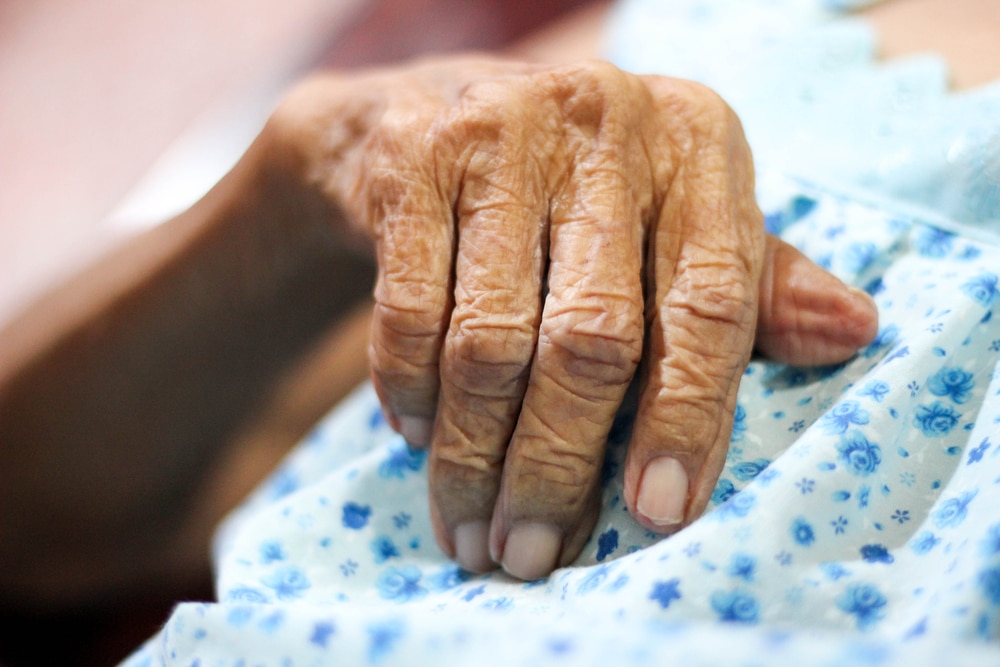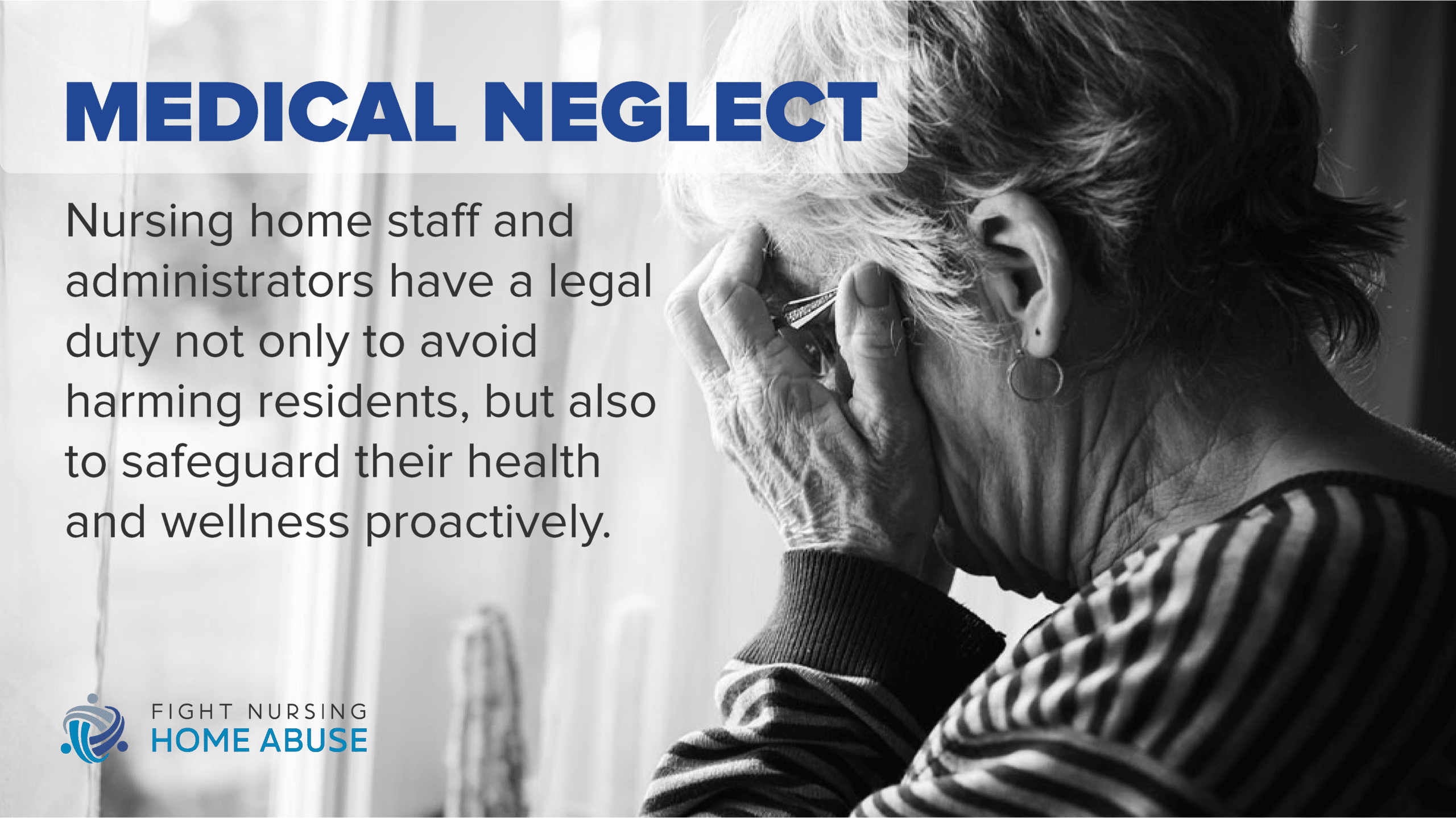Medical Neglect

Medical neglect in nursing homes can have devastating consequences for already-vulnerable victims. Failing to take steps to prevent infections, provide care for medical conditions, treat bedsores or otherwise provide adequate medical care can leave nursing home residents ill and suffering – and their caregivers liable.
Nursing home administrators and staff have a legal responsibility to provide safe, secure accommodations and services that promote the well-being of all residents. When those duties are neglected, you may receive compensation from those responsible.
Call 1-866-548-9636 today for a free case consultation. Speak with our nursing home abuse lawyer to learn more about your rights in nursing home care.
What is Medical Neglect?
Medical neglect occurs when caregivers and medical professionals violate the standard of care they owe to a patient. Nursing home standards of care vary by state, but in general, nursing home residents have the legal right to care and accommodations that are safe and support their physical, mental and emotional wellbeing.

What does medical neglect in nursing homes look like?
Nursing home residents are already more vulnerable than the general public to neglect and abuse. Varying degrees of mental and physical disability, ongoing medical conditions and isolation can all contribute to a resident’s vulnerability. The elderly may rely on others for their food, clothing, personal hygiene, medication administration and assistance with daily activities.
Nursing home staff and administrators have a legal duty not to only avoid harming residents, but also to safeguard their health and wellness proactively. Medical neglect can take many different forms – these are just a few examples:
- Ignoring complaints of pain, illness, abuse, or another mistreatment
- Failing to provide the proper medications at the right dose, at the right time
- Insufficient care to prevent bedsores, broken bones, head injuries, or infections
- Failing to obtain informed consent before a medical test or procedure
- Refusal to order or perform tests to diagnose a resident’s symptoms
- Withholding mobility aids, adaptive devices, indwelling devices, or other equipment the resident requires
- Inadequate supports for cognitive disability or mental illness
It is essential to report any instance of suspected medical neglect immediately. The primary concern is to ensure that the nursing home resident receives proper medical care as soon as possible. There may also be compensation available to aid in their recovery and ongoing care.
Detecting Medical Neglect in Nursing Homes
Medical neglect can be difficult to detect and prove. Victims may fear the repercussions of reporting or have experienced threats. This is why it is so important that caregivers and family members be vigilant in watching for and reporting neglect. Do not ignore these warning signs of medical neglect:
- Malnutrition or dehydration
- Wounds and lacerations that are recurring or do not heal
- Sudden weight loss
- Bedsores or sacral ulcers
- Broken bones or head injuries resulting from falls, mainly if those falls are frequent or happen while the resident is unsupervised
- Unexplained changes in behavior including increased anxiety, withdrawal, or fear
- Signs of poor personal hygiene
- Environmental hazards including dirty public areas, poor lighting, unsafe wheelchairs or other mobility aids, inadequate building maintenance, and more
If you witness any signs of neglect in a nursing home, call 1-866-548-9636 now for a free case consultation. There is help available to protect your rights and bring those responsible to justice.
How You Can Prevent Medical Neglect in Nursing Homes
Family members living near the nursing home should often visit to stay in tune with subtle changes in the resident’s care, living conditions and overall wellness. However, this is not an option for all families. Nursing home staff and administrators each have a responsibility to ensure that the standards of care are always met for all residents.
Best practices to help create an environment in which medical neglect is less likely to occur include:
- Keeping all flooring, furniture, washrooms, and other building facilities clean and free of debris that could pose a tripping hazard
- Providing adequate sanitation and hygiene standards to reduce residents’ risk of infections such as MRSA, C. difficile, sepsis, and more
- Ensuring proper staffing levels and nurturing a culture in which all staff feel empowered to report concerns to nursing home administration
- Giving caregivers access to proper equipment for lifting, transferring, bathing, toileting, feeding and providing other care in as safe a fashion as possible
- Having systems in place to ensure that each resident receives their medication at the proper dose and interval
- Providing healthy, nutritious meals and hydration to support the good health of residents
If you suspect that a nursing home resident is experiencing medical neglect, call 1-866-548-9636 to learn more about the process of reporting it and how victims can seek compensation.
Help Available to Victims of Medical Neglect in Nursing Homes
Medical neglect can have a devastating impact on the mental and physical health of an elderly resident. Compensation from those responsible can help pay for medical costs, mobility and adaptive equipment, counseling, and other expenses incurred as a result of the mistreatment. In some cases, a judge may order compensation for pain and suffering, as well.
Those who run nursing homes are accountable to state regulators for maintaining mandated standards of care. There may be penalties, increased inspections or other corrective measures taken when those standards are not met.
Medical neglect can be a profoundly hurtful and stressful experience for victims. Failing to provide the medical care a resident needs can even result in long-term damage, disability or even death.
It is critical that medical neglect in nursing homes is reported immediately. Documenting the circumstances in which it occurred, who was responsible, what preventative measures were or were not taken, who as aware of the neglect, how the victim was affected and more will help make the case for compensation.
Getting Help with Medical Neglect
If you suspect medical neglect in a nursing home, you should know that you do not have to fight this alone. At Fight Nursing Home Abuse, we offer a free initial consultation to inform victims and their families of their legal rights and the recourse available to them. Call 1-866-548-9636 now to start yours.


